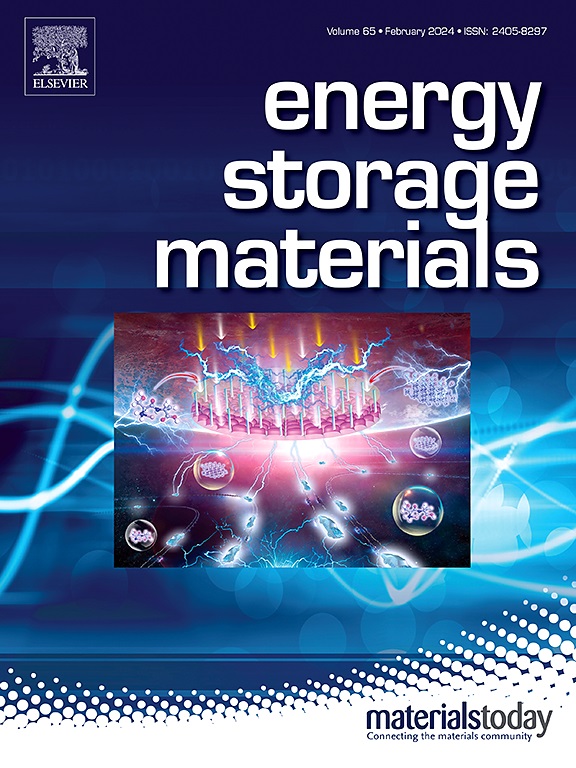Unraveling the Impact of CNT on Electrode Expansion in Silicon-based Lithium-ion Batteries
IF 18.9
1区 材料科学
Q1 CHEMISTRY, PHYSICAL
引用次数: 0
Abstract
A high-capacity silicon-based anode has been used in commercial lithium-ion batteries as a form of an addition to an existing graphite electrode for the realization of high energy density. However, under industrial conditions using high-density electrodes (>1.6 g cc–1, low electrode porosity), the electrode expansion becomes more severe, which engenders the decrease in energy density and safety issues. Carbon nanotubes (CNTs) have emerged as promising additives due to their outstanding electrical conductivity and mechanical strength. Despite their potential, the chemo-mechanical and electrochemical roles of CNTs in silicon-based anodes are not fully understood. Herein, we identify the mechanisms by which CNTs enhance silicon-based anodes with constructive comparison of commercial conductive agents. Our results show that CNTs alleviate strain-induced interfacial reactions and control the growth of the solid electrolyte interphase (SEI) layer during cycling. CNTs provide mechanical reinforcement, reducing particle-level cracking and enhancing electron pathways, which lowers surface tension and decelerates crack propagation. This significantly diminishes electrode pulverization and swelling. As a result, we observe a stable cycling stability (Cycle life: 94.6% for 100 cycles) of silicon-graphite composite (SGC) in 1 Ah pouch-type full cell. Remarkably, the SGC blended with graphite showed better electrochemical performance at low temperature cycling, fast-charging cycling and rate capability compared to the conventional graphite.碳纳米管对硅基锂离子电池电极膨胀的影响
高容量硅基阳极已被用于商用锂离子电池,作为现有石墨电极的一种附加形式,以实现高能量密度。然而,在工业条件下使用高密度电极(>1.6 g cc-1,低电极孔隙率),电极膨胀变得更加严重,从而导致能量密度下降和安全问题。碳纳米管(CNTs)由于其优异的导电性和机械强度而成为一种很有前途的添加剂。尽管具有潜力,但碳纳米管在硅基阳极中的化学-力学和电化学作用尚未完全了解。在此,我们通过与商业导电剂的建设性比较,确定了碳纳米管增强硅基阳极的机制。研究结果表明,在循环过程中,CNTs减轻了应变诱导的界面反应,并控制了固体电解质界面层(SEI)的生长。CNTs提供机械强化,减少颗粒级裂纹,增强电子路径,从而降低表面张力,减缓裂纹扩展。这大大减少了电极粉化和膨胀。结果表明,硅-石墨复合材料(SGC)在1 Ah袋式充满电池中具有稳定的循环稳定性(100次循环寿命为94.6%)。值得注意的是,与普通石墨相比,掺合石墨的SGC在低温循环、快速充电循环和倍率性能方面表现出更好的电化学性能。
本文章由计算机程序翻译,如有差异,请以英文原文为准。
求助全文
约1分钟内获得全文
求助全文
来源期刊

Energy Storage Materials
Materials Science-General Materials Science
CiteScore
33.00
自引率
5.90%
发文量
652
审稿时长
27 days
期刊介绍:
Energy Storage Materials is a global interdisciplinary journal dedicated to sharing scientific and technological advancements in materials and devices for advanced energy storage and related energy conversion, such as in metal-O2 batteries. The journal features comprehensive research articles, including full papers and short communications, as well as authoritative feature articles and reviews by leading experts in the field.
Energy Storage Materials covers a wide range of topics, including the synthesis, fabrication, structure, properties, performance, and technological applications of energy storage materials. Additionally, the journal explores strategies, policies, and developments in the field of energy storage materials and devices for sustainable energy.
Published papers are selected based on their scientific and technological significance, their ability to provide valuable new knowledge, and their relevance to the international research community.
 求助内容:
求助内容: 应助结果提醒方式:
应助结果提醒方式:


